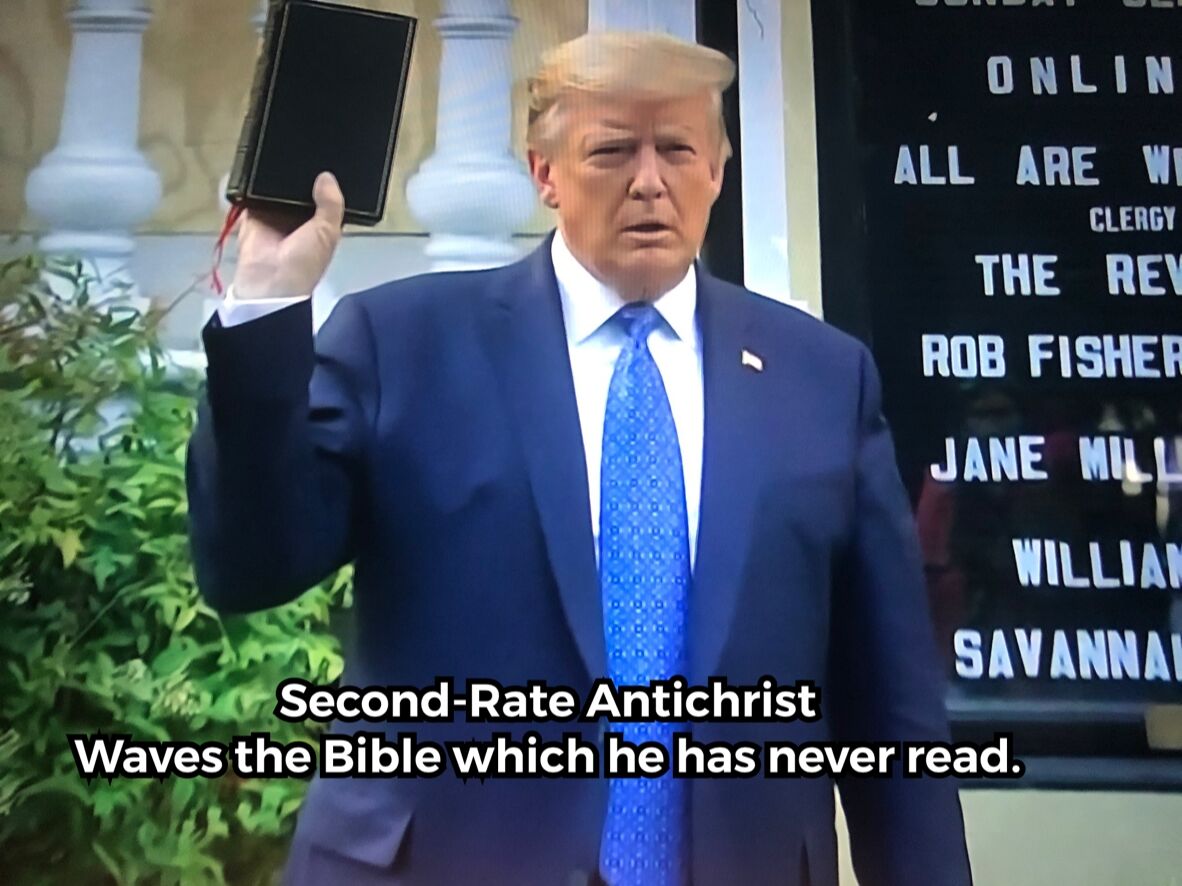Trump & The Antichrist: Is Donald Trump The Biblical Antichrist?
Is Donald Trump the Antichrist? This question, echoing through pulpits, political rallies, and online forums, reflects a deep-seated anxiety about the future and a struggle to reconcile faith with the complexities of the modern world. The former president's actions, rhetoric, and the fervent support he garners from various groups have ignited a firestorm of speculation, drawing parallels between his persona and the biblical figure of the Antichrist. But is this comparison justified, or is it merely a reflection of our own fears and biases?
The debate surrounding Donald Trump and the Antichrist is not new. It's a recurring theme that emerges during times of social and political upheaval. The figure of the Antichrist, described in the Bible, particularly in the Book of Revelation, represents a powerful, deceptive individual who will oppose Christ and lead many astray. This has made the term "Antichrist" a potent symbol, readily applied to those perceived as threats to religious and moral values.
To understand the current discourse, it's essential to examine the context in which these comparisons are being made. The Trump presidency, marked by controversy, strong opinions, and unprecedented events, provided fertile ground for such speculation. His pronouncements, such as proclaiming himself the "chosen one," fueled the fire. Allegations of his behavior have been compared to the actions of historical figures associated with the Antichrist, and the devoted support he received from many Christians further complicates the narrative.
- Find Movies More Latest Updates Reviews Movierulz Streaming
- Where To Watch Stream Movies Your Ultimate Guide 2024
However, the question of whether Donald Trump fits the profile of the Antichrist is complex. Biblical scholars have debated the Antichrist for centuries, leading to many different interpretations. Some draw parallels between his actions and specific prophecies, while others caution against taking such comparisons literally. Ultimately, the answer may lie in a careful examination of both biblical texts and the actions of the individual in question. Here's an overview:
| Category | Details |
|---|---|
| Full Name | Donald John Trump |
| Date of Birth | June 14, 1946 |
| Place of Birth | Queens, New York City, USA |
| Education | Fordham University (attended), University of Pennsylvania (B.S. in Economics) |
| Spouse(s) | Ivana Zelnkov (m. 19771992), Marla Maples (m. 19931999), Melania Knauss (m. 2005present) |
| Children | Donald Trump Jr., Ivanka Trump, Eric Trump, Tiffany Trump, Barron Trump |
| Political Party | Republican |
| Political Career | 45th President of the United States (2017-2021) |
| Business Interests | Real estate, entertainment, branding |
| Key Positions | Chairman and President of The Trump Organization, Founder of Trump Entertainment Resorts |
| Net Worth (estimated) | Varies, estimated to be in the billions |
| Controversies | Multiple, ranging from business practices to political conduct |
| Website | Official Website |
The allure of such comparisons is understandable. The rise of a figure like Trump, seemingly defying established norms and upsetting the political order, can feel apocalyptic to some. Many Christians, in particular, are drawn to this narrative due to the biblical descriptions of the Antichrist.
The Book of Revelation paints a picture of a charismatic leader who will deceive many and wage war against the forces of good. Trump's history and actions are seen by some as fulfilling these prophecies. His brashness, his business background, and his skillful use of rhetoric have led to comparisons with the Antichrist.
However, the use of the term "Antichrist" is not without its critics. Some theologians argue that it's essential to differentiate between metaphorical applications of the term and its specific theological implications within Christian doctrine. Moreover, they suggest that using such comparisons risks oversimplifying complex issues and can lead to inaccurate conclusions.
One recurring element in the discussion is the perceived betrayal of the gospel by some Christians who support Trump. They argue that Trump's behavior and policies contradict the values of Christianity. Yet, Trump's popularity among a significant portion of the Christian community shows a complex relationship between faith and politics.
Nostradamus, the 16th-century French astrologer, has also entered the equation. His quatrains, or four-line verses, have been interpreted as prophecies concerning Donald Trump. The interpretations are subjective and highly debated, with different individuals drawing different conclusions from the same verses. These interpretations add a layer of complexity to the discussion, blending religious and astrological perspectives.
Furthermore, the debate extends beyond the United States. The rise of populism and nationalist movements globally has triggered similar discussions about leaders and their impact. What is happening in the US, therefore, is part of a broader pattern of change.
One of the most crucial questions in all of this is: Are we living as citizens of God's kingdom, or have we sold out to the political beast of the moment? This question touches upon the core of faith and its role in the modern world. It challenges individuals to reflect on their priorities and commitments and consider the implications of their choices.
The idea of the Antichrist has been used throughout history to demonize political opponents. Every protestant reformer, without exception, spoke of the papacy as antichrist.
One thing is clear: The questions raised by the Trump phenomenon are far from new. Throughout history, political leaders have been likened to the Antichrist. The specific comparisons and arguments vary depending on the era and the individuals involved, but the underlying themes remain consistent: The struggle between good and evil, faith and doubt, and the desire to understand the future. The term has become a broad one. In the current cultural and political climate, it's easy to see how such fears and suspicions can arise, and why the comparison with Donald Trump has become so prevalent.
Trump's arrest being construed as an unjust persecution, in the same vein as the crucifixion of christ. Whether or not trump is the antichrist is beside the point. The focus must remain on whether we are living as citizens of god\u2019s kingdom, or have we sold out to the political beast of the moment?
So, what do we make of all this? Ultimately, the question of whether Donald Trump is the Antichrist remains unanswered. It is a question that depends on an individual's beliefs, interpretations, and perspectives. While comparisons can be made based on Trump's actions, rhetoric, and the support he receives, it's essential to exercise caution and avoid making sweeping judgments. What we can do is reflect on the deeper questions raised by the current political and religious climate: Where does our faith lie? How do we navigate the complexities of the modern world? And what role do we play in shaping the future?
Article Recommendations
- Movierulz 2025 Latest Telugu Movies Trends Stay Updated
- Trending Now Latest Telugu Releases More Refer Earn Gold



Detail Author:
- Name : Prof. Dino Boyer
- Username : btorphy
- Email : dkeeling@hotmail.com
- Birthdate : 2006-05-22
- Address : 668 Kasandra Drive Apt. 738 West Evelynside, RI 70816
- Phone : +1.410.287.8232
- Company : Predovic, Jaskolski and Schneider
- Job : Diesel Engine Specialist
- Bio : Sed vitae autem ullam a est. Aperiam sapiente minus est iure quis aliquid. Dolorum ipsa eos quasi dolore quo libero quae. Aperiam ratione adipisci et asperiores distinctio ut et.
Socials
linkedin:
- url : https://linkedin.com/in/roderickpollich
- username : roderickpollich
- bio : Itaque laborum aut sit distinctio harum.
- followers : 2112
- following : 2788
tiktok:
- url : https://tiktok.com/@roderickpollich
- username : roderickpollich
- bio : Ad non quia placeat. Dolorum magnam iusto fugiat accusamus a distinctio.
- followers : 843
- following : 2894
facebook:
- url : https://facebook.com/roderickpollich
- username : roderickpollich
- bio : Nesciunt ut praesentium molestias tenetur quisquam. Quos et aut est.
- followers : 3320
- following : 558